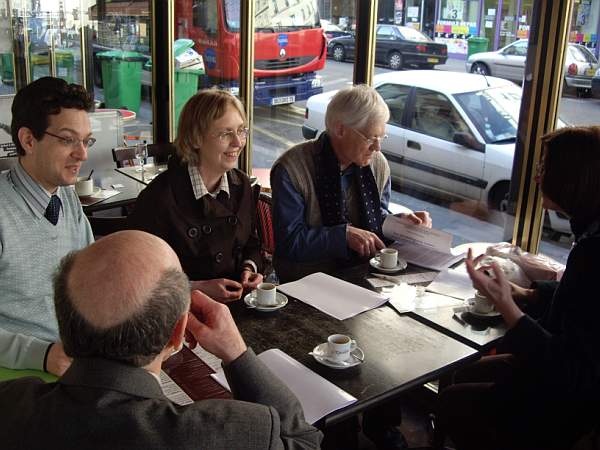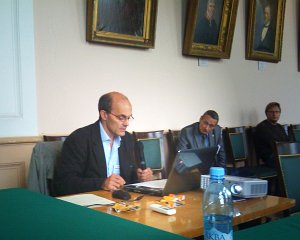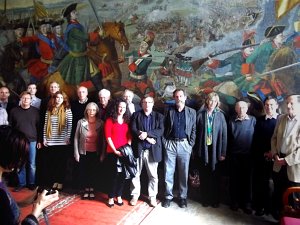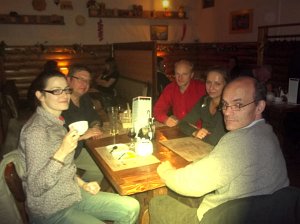Research programs
|
Research Program on Louis Lapicque (1866-1952)
This program is dedicated to all scientific, societal and political aspects of the life and work of Louis Lapicque. This figure, critised in the domain of neurophysiology, remains central to understand the politico-scientific conditions at stake in the scientific research of the interwar period in the international context.
Research programme on neurodegeneration with Normastim ANR (2015-2018)
Normastim ANR studies legal, philosophical and sociological aspects at stake in neuroscience, focussing on Deep Brain Stimulation, a therapetic approach between experimental and clinical neurosurgery, neurology and psychiatry. The history group, involving Jean-Claude Dupont, Céline Chérici, Laura Bossi, Baptiste Moutaud and Jean-Gaël Barbara, works to better define the concept of neurodegenerative disease and its epistemological issues at stake in defining pathologies and therapeutical paradigms.
ANR normastim
Program on the history of neurosciences and the biological sciences between France and Russia, relations and comparisons
This research program started with a project on Russian physiologists, Schema, Pavlov and Kekterev and their relations with France in the
19th and 20th centuries. The project was directed by Jean-Gaël Barbara and Jean-Claude Lecas from the
Laboratoire de Neurobiologie des processus adaptatifs (UMR7102), in collaboration with the
Laboratoire d’histoire des sciences REHSEIS (UMR7596). We aimed to understand the role of French experimental physiology in the rise of Russian neurophysiology
and the impact of Pavlovism in France, especially in the context of behaviourism, the Cold War period and cybernetics.
A first meeting took place on January 19th 2007. François Clarac gave a paper on the history of the concept of reflex action in Schema. Pierre Buser (from the Academy of sciences) dealt with Pavlov and Pavlovism in France after the Second World War. Jean-Claude Lecas presented his work on Bekhterev and his links with France. Jean-Claude Dupont analysed the relations between physiology and psychology in Russia, from Schema to Pavlov. The meeting showed a great interest for these
issues among neuroscientists, especially those scientists who had close collaborations with Russian teams after 1955 : Pierre Buser, Jacques Taxi, André Calas, Jean Massion, Alain Berthoz. We were honoured to welcome Michael Ugrumov from the Russian Academy of Sciences.
Professor Ugrumov urged us to engage in a collaborative project on these issues. Thanks to Jean Massion, we contacted Marat Ioffe, Elena Biryukova and Alexander Frolov from the Institute of Higher Nervous Activity, all
are interested in the historical relations between France and Russia in the neurosciences and particularly the field of biomechanics.
A second meeting was organised on April 16th-19th 2008 with special funds from CNRS and the Russian National Agency for Basic Research. The program focussed on the study of Franco-Russian relations before and after Pavlov and the role of Pavlovism in French neurophysiology. Other topics were discussed on the relations between Claude Bernard and the first experimental physiologists in Russia, the role of France in the opening of USSR to the West after the Second World War, the reception of Henri Poincaré in Russian biomechanics and the Russian precyberneticians. Those topics were commented in several detailed papers given by our collaborators either French or Russian. The success of the meeting urged us to ask for future funding
in order to continue the collaborative work the next year. A book was already being prepared. This field of the history of science is rich, in part because new material is accessible now in Russia. Also, a regain interest can be noticed in France, with an emphasis on the analyses of political contexts in the rise of scientific domains. This research program is currently funded by the creation of a CNRS GDRI (international research group).
A convention was signed by CNRS, Université Pierre et Marie Curie, Université de la Méditerranée, le Collège de France, Université Paris 1 Panthéon-Sorbonne, Académie des Sciences de Russie, the Russian Fund for Basic Science and Russian People’s Frindship university.
|
 |
Franco-Russian informal meeting during the Paris colloquium in 2008, from left to right, J.G. Barbara, Elena Biryukova, Roger Smith and, on the first row, Marat Ioffe and Irina Sirotkina.
|
A colloquium was organised during the official French-Russian year 2010 on the History of Biological Sciences between France and Russia: Crossed relations and histories, Paris, September 15-16 2010 by the GDRI, in collaboration with Alain Berthoz (Collège de France), NPA laboratory, CNRS UMR 7102. The speakers examined various aspects of French-Russian relations in the biological sciences including evolution theory, embryology, psychology, neurology, neurophysiology, biomechanical sciences and the neurosciences.
A second colloquium took place in Saint-Petersburg on September 13-14 2011 on Russian-French Links in Biology and Medicine, organised by Eduard Kolchinsky, Director of the Saint Petersburg branch Institute for the history of science and technology of the Russian Academy of Sciences – and our GDRI.
Photos :
 |
 |
|
Conference room
Saint-Petersburg Academy of Sciences |
Stéphane Tirard |
 |
|
Jean-Claude Dupont
|
 |
 |
- Liva Pormale, Jean-Claude Dupont, Igor Popov and his wife,
Stéphane Tirard at Saint-Petersburg, September 2011. |
|
|